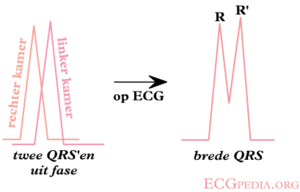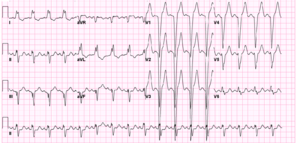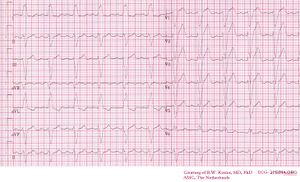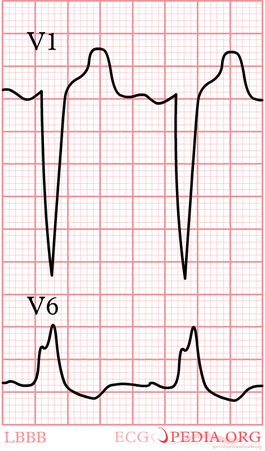LBBB: Difference between revisions
Jump to navigation
Jump to search
No edit summary |
No edit summary |
||
| Line 1: | Line 1: | ||
<onlyinclude>{{Box| | |||
;Criteria for left bundle branch block (LBBB) <cite>Garcia</cite> | ;Criteria for left bundle branch block (LBBB) <cite>Garcia</cite> | ||
:QRS >0,12 sec | :QRS >0,12 sec | ||
:Broad monomorphic R waves in I and V6 with no Q waves | :Broad monomorphic R waves in I and V6 with no Q waves | ||
:Broad monomorphic S waves in V1, may have a small r wave | :Broad monomorphic S waves in V1, may have a small r wave | ||
}} | |||
{| align="right" | |||
|- | |||
| | |||
[[Image:Ontstaan_LBTB.png|thumb| In a LBBB, the left ventricle is depolarized later than the right ventricle.]] | [[Image:Ontstaan_LBTB.png|thumb| In a LBBB, the left ventricle is depolarized later than the right ventricle.]] | ||
[[Image:12leadLBTB.png|thumb| Left bundle branch Block on a 12 lead ECG.]] | [[Image:12leadLBTB.png|thumb| Left bundle branch Block on a 12 lead ECG.]] | ||
[[Image:12leadLBTB002.jpg|thumb| Another example of Left bundle branch Block on a 12 lead ECG.]] | [[Image:12leadLBTB002.jpg|thumb| Another example of Left bundle branch Block on a 12 lead ECG.]] | ||
| | |||
[[Image:LBBB.png|thumb|265px| In a LBBB, the last depolarization wave is in the left ventricle. This wave is directed away from V1. On the ECG, V1 will show a negative complex.]] | |||
|} | |||
In ''left bundle branch block'' (LBBB) the conduction in the left bundle is slow. This results in delayed depolarization of the left ventricle, especially the left lateral wall. The electrical activity in the left lateral wall is unopposed by the usual right ventricular electrical activity. The last activity on the ECG thus goes to the left or away from V1. Once you remember this, LBBB is easy to understand. | In ''left bundle branch block'' (LBBB) the conduction in the left bundle is slow. This results in delayed depolarization of the left ventricle, especially the left lateral wall. The electrical activity in the left lateral wall is unopposed by the usual right ventricular electrical activity. The last activity on the ECG thus goes to the left or away from V1. Once you remember this, LBBB is easy to understand. | ||
| Line 13: | Line 19: | ||
Also read [[RBBB|right bundle branch block]]. | Also read [[RBBB|right bundle branch block]]. | ||
{{clr}}</onlyinclude> | |||
{{Box| | |||
==References== | ==References== | ||
<biblio> | <biblio> | ||
| Line 19: | Line 26: | ||
#wellens isbn=9781416002598 | #wellens isbn=9781416002598 | ||
</biblio> | </biblio> | ||
}} | |||
Revision as of 14:51, 2 June 2009
- Criteria for left bundle branch block (LBBB) [1]
- QRS >0,12 sec
- Broad monomorphic R waves in I and V6 with no Q waves
- Broad monomorphic S waves in V1, may have a small r wave
In left bundle branch block (LBBB) the conduction in the left bundle is slow. This results in delayed depolarization of the left ventricle, especially the left lateral wall. The electrical activity in the left lateral wall is unopposed by the usual right ventricular electrical activity. The last activity on the ECG thus goes to the left or away from V1. Once you remember this, LBBB is easy to understand.
Diagnosis of myocardial infarction in LBBB can be difficult.
Also read right bundle branch block.



